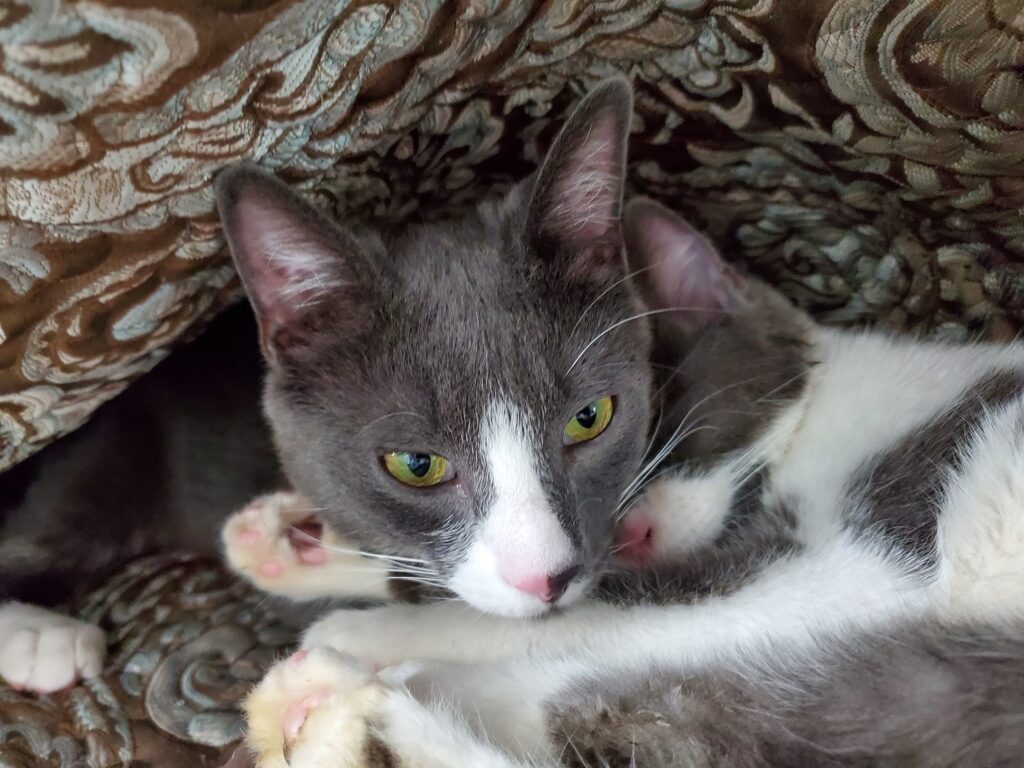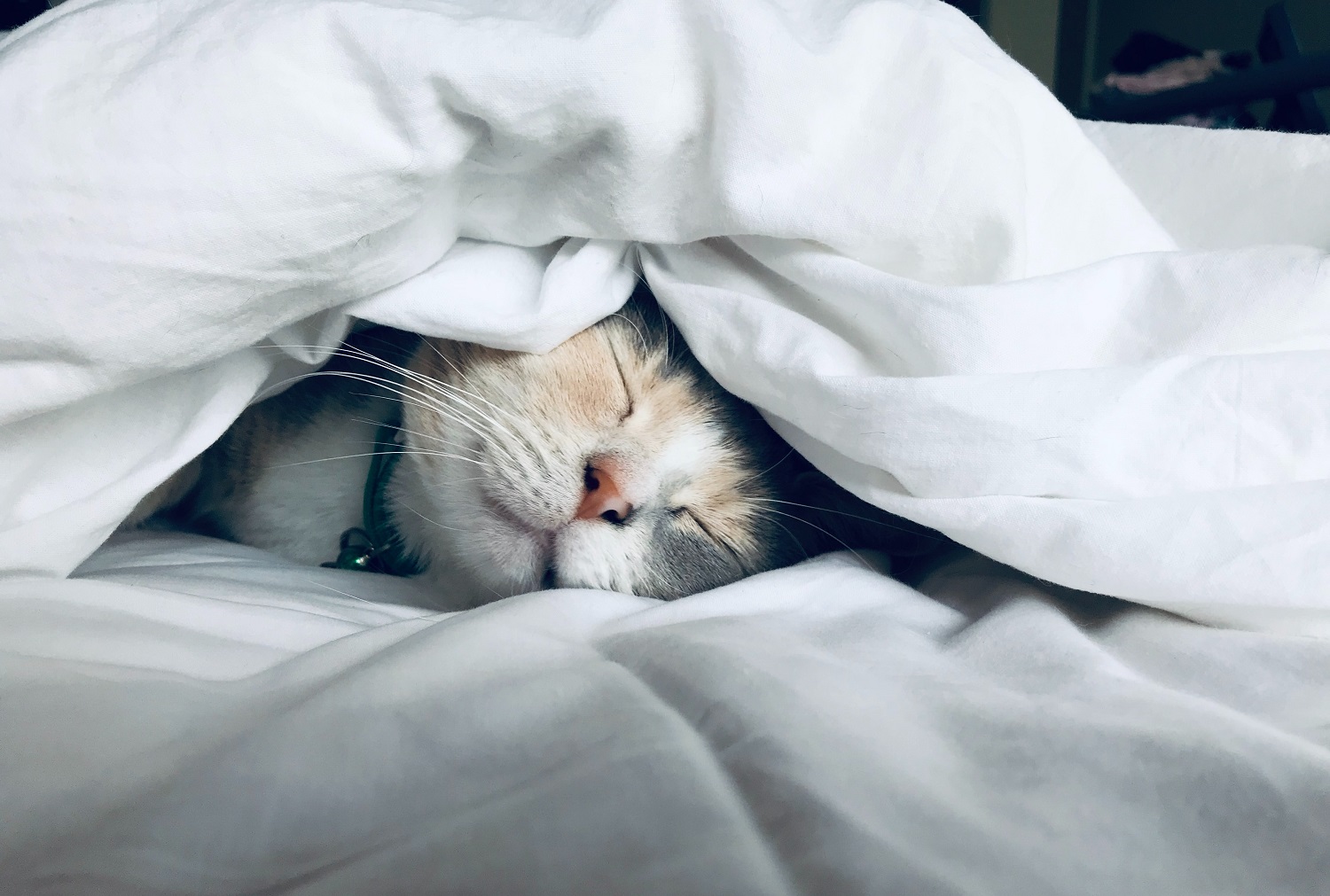You walk into the room, notice a suspicious lump in the blanket, and realize your cat has tucked themselves under the covers like a furry burrito. Naturally, your first thought is: can they breathe under there?
Yes, they can. And probably better than you think.
Cats are surprisingly skilled at choosing safe, cozy spots for sleep. If they are curled up under a blanket, it is not because they are confused or stuck. It is because they feel safe, warm, and perfectly in control of their little blanket fort.
Still, it is normal to wonder how this works and whether there are ever risks. Let’s take a closer look at what is going on when your cat vanishes into the depths of your bedding.
Do Cats Really Breathe Just Fine Under Blankets?
In most cases, yes. Cats can absolutely breathe under blankets. Most standard bedding is not airtight, and cats are excellent at positioning themselves so they have access to fresh air, even if it is not immediately obvious to us.
Cats are naturally cautious animals. If they feel uncomfortable or cannot get enough air, they will wiggle out and move somewhere else. They do not typically fall asleep in places that feel unsafe or suffocating.
If your cat is sleeping under a loose blanket, it is likely no more dangerous than them curling up inside a box, drawer, or laundry basket.
Why Cats Like Sleeping Under Blankets
There are a few reasons your cat might burrow under the covers like a sleepy little submarine.
1. Warmth
Cats love warmth. A cozy blanket creates a heated microclimate that helps them stay toasty, especially during colder months or if they nap in a drafty area.
If your cat is always diving into blankets, they may simply be trying to stay warm. Think of it like their personal electric blanket, only powered by their own body heat.
Related read: What Your Cat Is Really Saying When They Arch Their Back.
2. Security and Comfort
Blankets offer a soft, enclosed space that helps cats feel protected. Being covered makes them feel hidden from view, which can reduce anxiety and promote better sleep.
This behavior is especially common in cats who are shy, new to the home, or recovering from stress. Under the covers, the world becomes quiet and safe.
3. Habit or Imitation
If your cat often sleeps in your bed or sees you getting cozy under the covers, they might be copying your behavior. Cats learn by observing, and it is not unusual for them to mimic the habits of their favorite humans.
Plus, they probably think your scent makes the blanket even more appealing.

Silly humans! You think you can find me under this blanket? Think again! I’m a master of disguise, a ninja of hiding, and the champion of snuggling under blankets. #KittyHideout #BlanketNinja #DontBotherMe
Winston (and his Sleepy Sidekick Joey)
Is It Ever Dangerous?
While most cats are smart about where they sleep, there are a few things to keep in mind.
Watch out for:
- Weighted blankets, which can be too heavy and restrict movement
- Tightly wrapped covers, where your cat might get tangled or stuck
- Heated blankets that get too warm and pose a risk of overheating
- Sick, elderly, or very young kittens who may have trouble moving or regulating their body temperature
If your cat is very small or has mobility issues, it is a good idea to check on them periodically or provide a covered cat bed instead of letting them burrow under layers of bedding.
Tips for Blanket-Loving Cats
If your cat loves sleeping under blankets, you do not need to stop them. Just make it as safe and comfortable as possible.
- Use lightweight blankets they can move under and out of easily
- Leave one corner of the blanket open so air can flow through
- Avoid tucking them in or wrapping them too tightly
- Offer alternative hiding spots like covered beds or cozy tents
You can even create a designated nap zone with a soft throw and a pillow so they can burrow without getting lost in your sheets.
Final Thoughts: Your Cat Is Not Going to Suffocate
If your cat is snoozing under the blanket, they are not trapped. They are living their best nap life in a warm, enclosed cocoon that they chose for themselves.
As long as they can come and go freely and the blanket is not too heavy or tight, you can let them enjoy their cozy hideout without worry. Cats are experts at comfort, and if they can nap under a blanket, they absolutely will.
Just remember where they are before you sit down.
Sources:
– Cat Sleeping Habits and Safety https://www.petmd.com/cat/behavior/why-do-cats-like-sleeping-under-blankets
– Understanding Feline Thermoregulation https://vcahospitals.com/know-your-pet/understanding-your-cats-temperature-regulation
– Cat Comfort Behavior Explained https://www.aspca.org/pet-care/cat-care/common-cat-behavior-issues
– Why Do Cats Hide Under Covers? https://www.humanesociety.org/resources/why-do-cats-hide
– Safe Sleeping Spots for Cats https://www.icatcare.org/advice/cat-behaviour/choosing-safe-cat-sleeping-spots
Recent Posts
Explore why cats sleep so much, including the evolutionary reasons and the health benefits they derive from their extensive sleep patterns.
Explore the causes of cat dandruff, its implications, and effective ways to deal with it so your feline friend remains happy and healthy.


